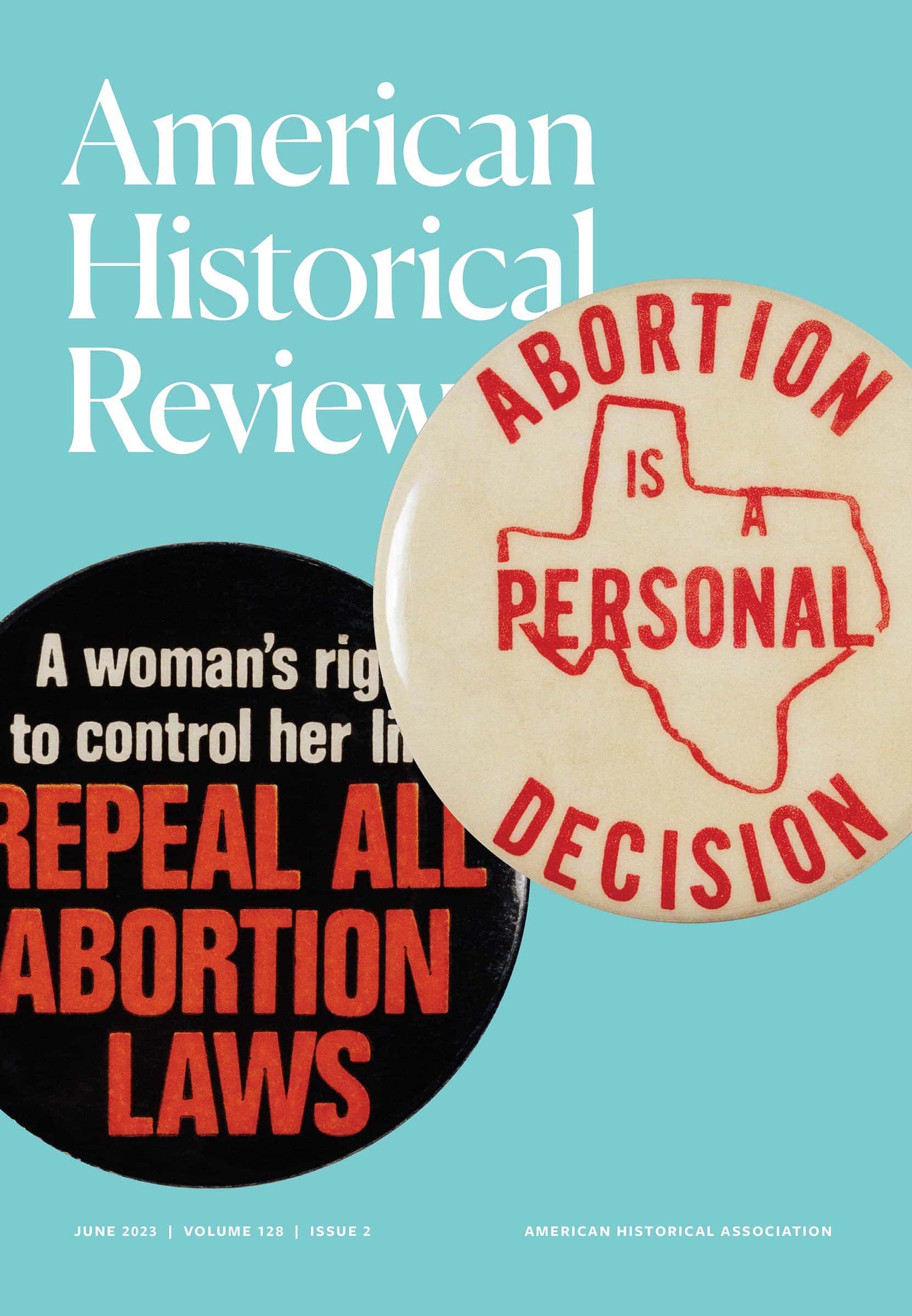The June issue of the American Historical Review contains articles that explore transnational histories of mid and late 20th-century China and Latin America and that reconsider aspects of the early modern world in Europe.

The cover of the June AHR evokes the nature of abortion politics in Texas during the 1970s by reproducing dueling political buttons of the era. The June History Lab features a collaboration between two podcasts—Sexing History and the AHR’s History in Focus—that tells the story of a former evangelical minister and his wife who have provided abortion care in East Texas since the 1960s. David J. & Janice L. Frent/Corbis via Getty Images.
Denise Y. Ho’s (Yale Univ.) “Oysterman and Refugee: Hong Kong and China between the Tides, 1949–1997,” examines the Hong Kong–China maritime border. Ho shows how oystermen in the tidelands of the Pearl River Estuary, some of them refugees, offer a case study in two forms of agricultural production: traditional land and labor relations on the Hong Kong coast and collective agriculture in China’s socialist period followed by decollectivization in the reform era. By Mao’s death in 1976, China’s oyster industry exceeded Hong Kong’s, but both were vulnerable to industrial pollution. In the following years, China’s oystermen built on persistent networks to navigate their position among Hong Kong, Shenzhen, and the Pearl River Delta. Ho argues that the prosperity of China’s oystermen, when compared to that of the Hong Kong refugees, illustrates the inversion of the border’s meaning as the region transitioned from a postcolonial past to a postsocialist future.
Margarita Fajardo (Sarah Lawrence Coll.) considers the entangled histories of the International Monetary Fund and the United Nations Economic Commission for Latin America in “CEPAL, the ‘International Monetary Fund of the Left’? The Tale of Two Global Institutions.” Born of the same global moment, she argues, these institutions have come to represent two opposing visions of world economic order. Yet their mutual antagonism was not a foregone conclusion. While the story of the IMF is often told as one of projection of power and dominance by the Global North and resistance of the South, Fajardo suggests that looking at the two organizations in tandem as they converged, diverged, and shaped each other demonstrates the impact of a southern institution and Latin America in the northern institution and the structure of global governance. In doing so, she advances our understanding of global institutional history and economic governance at a moment when international institutions have lost prestige and leverage.
Averages, John E. Crowley (Dalhousie Univ.) argues in “How Averages Become Normal,” became a distinctive form of information in early modern European culture, first in commercial arithmetic, then in natural philosophy, demography, political economy, and eventually eclectic social analysis. Averaging provided an empirical and heuristic resource for understanding everything from planetary orbits to fertility and mortality rates, the return on stock market investments, and the trivia of daily life. Crowley suggests that as natural philosophers turned to quantitative evidence, the finances of the military-fiscal state required administration on a more complex scale, and parliamentary politics increasingly resorted to numerical argument, quantitative capabilities like averages became a respectable and readily deployed form of fact.
In “‘Improper and Almost Rebellious Conduct’: Enslaved People’s Legal Politics and Abolition in the British Empire,” Max Mishler (Univ. of Toronto) explores the aftermath of early 19th-century British ameliorative statutes and procedural reforms that encouraged slaves to petition magistrates for legal redress. He demonstrates that enslaved people vigorously defended newfound “rights” to bodily protection, sustenance, and family preservation through the instigation of legal complaints against overseers, managers, and slave owners. The judicialization of quotidian battles over the terms of enslavement, he argues, refashioned colonial social relations and eroded slave owners’ power in the colonies, eventually prodding Parliament to pass the 1833 Slavery Abolition Act.
The challenge for historians has recently become not to find a historical subject with agency but a historical subject without it.
The History Lab opens with an essay that explores a collaboration between the AHR’s podcast, History in Focus, and the podcast Sexing History. In “Sex with the Sound On,” Gillian Frank (Princeton Univ.), Saniya Lee Ghanoui (Suffolk Univ.), and Lauren Jae Gutterman (Univ. of Texas at Austin) discuss making the episode “A Sacred Calling,” which tells the story of Curtis Boyd and Glenna Halvorson Boyd, a former evangelical minister and his wife, who have provided abortion care in East Texas since the 1960s in the face of increasing violence from the antiabortion movement. Through oral histories with the Boyds, archival sound, and thematic music, the episode uncovers a deep history of faith and love through a complex legal landscape of abortion access. Their essay outlines Sexing History’s practices and protocols in their research and production to illustrate the kinds of public-facing historical work podcasts as a genre can do. “We hope that in sharing our work and detailing our processes,” they write, “Sexing History can serve as a case study of the ways historians might use digital media to engage with a broad public audience eager to learn more about the historical context of current events, political debates, and cultural trends.”
The lab includes a forum on deglobalization in the two decades after World War I that brings together contributions by 10 historians of Europe. Its conveners Peter Becker (Univ. of Vienna) and Tara Zahra (Univ. of Chicago) contend “the simultaneity of globalization and antiglobalism was baked into the foundation of internationalist projects and accelerating global connection in the late nineteenth century.” The essays collected in the forum all seek to better understand the ways in which processes of globalization were transformed after 1918. They explore cases at a variety of scales, from governments, banks, and international institutions to small gardens, homes, factories, and farms. Together they suggest that globalism and antiglobalism, like nationalism and internationalism, rose on the same tide. In what is a first for the journal, the AHR asked Becker and Zahra to create a video that introduces the various arguments of the contributors to the forum, which can be found on the AHR’s website.
A second lab forum on historical agency opens with a deliberately provocative essay by Anna Krylova (Duke Univ.), a historian of Russia. “I wonder,” Krylova writes, “whether the challenge for historians has recently become not to find a historical subject with agency but a historical subject without it. How useful is such an indiscriminately expanded category that no longer asks a historian to make choices in her analysis?” Krylova offers an alternative conception of agency that draws on her own work on shifting gender roles in the Soviet military during World War II, advancing the concept of the “not-knowing actor” as a way out of what she calls the “agency dilemma.” We invited five historians whose work is closely bound up in exploring questions of historical agency to respond to Krylova’s essay, including William H. Sewell Jr. (Univ. of Chicago), Judith R. Walkowitz (Johns Hopkins Univ.), Geoff Eley (Univ. of Michigan), Angela E. Zimmerman (George Washington Univ.), and Vivien Tejada (Duke Univ.).
The June lab closes with Lucas Bessire’s (Oklahoma Univ.) History Unclassified essay, “Incident at Antelope Springs.” He experiments with narrative form to describe an encounter with a vanished spring in order to reflect more broadly on the political and ecological temporalities around environmental loss on the American High Plains.
This work is licensed under a Creative Commons Attribution-NonCommercial-NoDerivatives 4.0 International License. Attribution must provide author name, article title, Perspectives on History, date of publication, and a link to this page. This license applies only to the article, not to text or images used here by permission.



